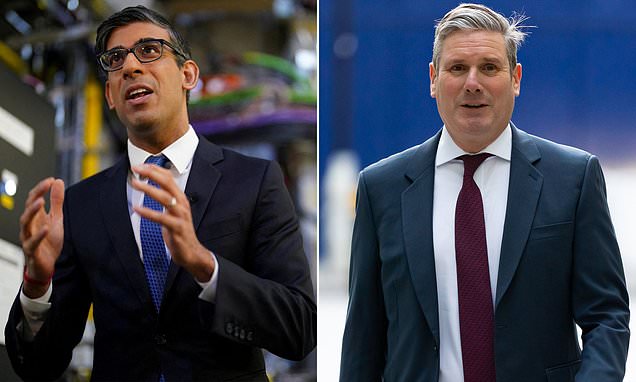Rishi Sunak is ‘likely to hold off calling a general election until October next year’: PM’s team ‘are waiting until autumn to call national vote amid hopes Britain’s economy will have recovered by then’
- Prime Minister likely to hold general election in October or November 2024
- Read more: Labour to launch fresh attack on Rishi Sunak over tax ‘loophole’
The Prime Minister is likely to wait to hold a general election until October or November next year, sources said last night.
Rishi Sunak’s team believes that waiting until the autumn will allow the electorate to benefit from the beginnings of any economic recovery and see the effects of his tough migrant boats package, the Daily Telegraph reported.
Sunak only became Prime Minister in October 2022, after Liz Truss’ brief and calamitous spell in Number 10.
A general election must be held by January 2025 according to parliamentary rules.
Some of the latest polling data suggests that Labour is maintaining its significant advantage over Sunak’s Conservative Party, with an average of 24 points between the parties.

Sunak only became Prime Minister in October 2022, after Liz Truss’ brief and calamitous spell in Number 10 (pictured in March 2023)

Keir Starmer’s Labour Party has maintained a significant lead in the polls, with one recent YouGov survey giving him a 40-point lead among voters in London
Earlier this year, Tory party chairman Greg Hands also appeared to signal that the second half of 2024 was the preferred date for a poll.
Having assumed the post in February, he told supporters in a message: ‘The next 18 months will see us win or lose the next general election.’
There has been speculation that Mr Sunak could opt for an earlier date in 2024.
Read more: Revealed: Nineteen suspected terrorists with links to groups including Islamic State crossed the Channel on small boats last year – with most ‘lodging asylum claims to stop them being deported’
A recent Guardian article said Keir Starmer’s Labour Party were convinced May of that year is the most likely month for a general election, to coincide with local elections.
‘Some of their voters will treat those local elections as midterms and protest against them, but they would otherwise vote Tory in a general election, because that’s what happens to governments.
‘If you’re a few points behind, why risk things looking worse? We have to be ready for May 24’, one Labour strategist said.
Following the repeal of the Fixed-term Parliaments Act 2011, the new Dissolution and Calling of Parliament Act lays out the rules on when an election must be called.
The latest date that parliament can dissolve is ‘the beginning of the day that is the fifth anniversary of the day on which it first met’.
The current parliament met on December 17, 2019 and an election must be held within 25 days of the five year anniversary. This will be in January 2025.
The repeal of the Fixed-term Parliaments Act returned the right to choose exactly when an election is held to the Prime Minister.
The Prime Minister of the day can go to the monarch and request that they dissolve Parliament, triggering a general election.
This might be because their five-year time limit is up or because they feel they have lost the support of their party.
Source: Read Full Article

